A Comparative Analysis of Statutory Derivative Claims and Common Law
VerifiedAdded on 2020/06/04
|15
|4747
|66
Report
AI Summary
This report provides a comparative analysis of statutory derivative claims and common law derivative actions, focusing on the protection afforded to minority shareholders. It begins by outlining the core principles of common law derivative claims, including the rule in Foss v Harbottle and its exceptions. The report then delves into the statutory derivative claim as outlined in the Companies Act 2006, highlighting its advantages and practical applications. It examines key sections of the Act, such as sections 260-264 and section 994, which address the rights of shareholders to bring claims for wrongdoing by directors and unfair prejudice. The report further discusses relevant case law, such as Universal project management service limited v Fort Gilkicker limited, Franbar Holding ltd v Patel and others, Ebrahimi V Westbourne Galleries, and Clark v Cutland, to illustrate the practical application of these legal principles. The analysis concludes by emphasizing how the statutory derivative claim offers a more effective remedy compared to common law, providing greater protection for minority shareholders against corporate misconduct. Overall, the report offers a thorough examination of the legal framework surrounding derivative claims and their impact on shareholder rights.

Project Report
Paraphrase This Document
Need a fresh take? Get an instant paraphrase of this document with our AI Paraphraser
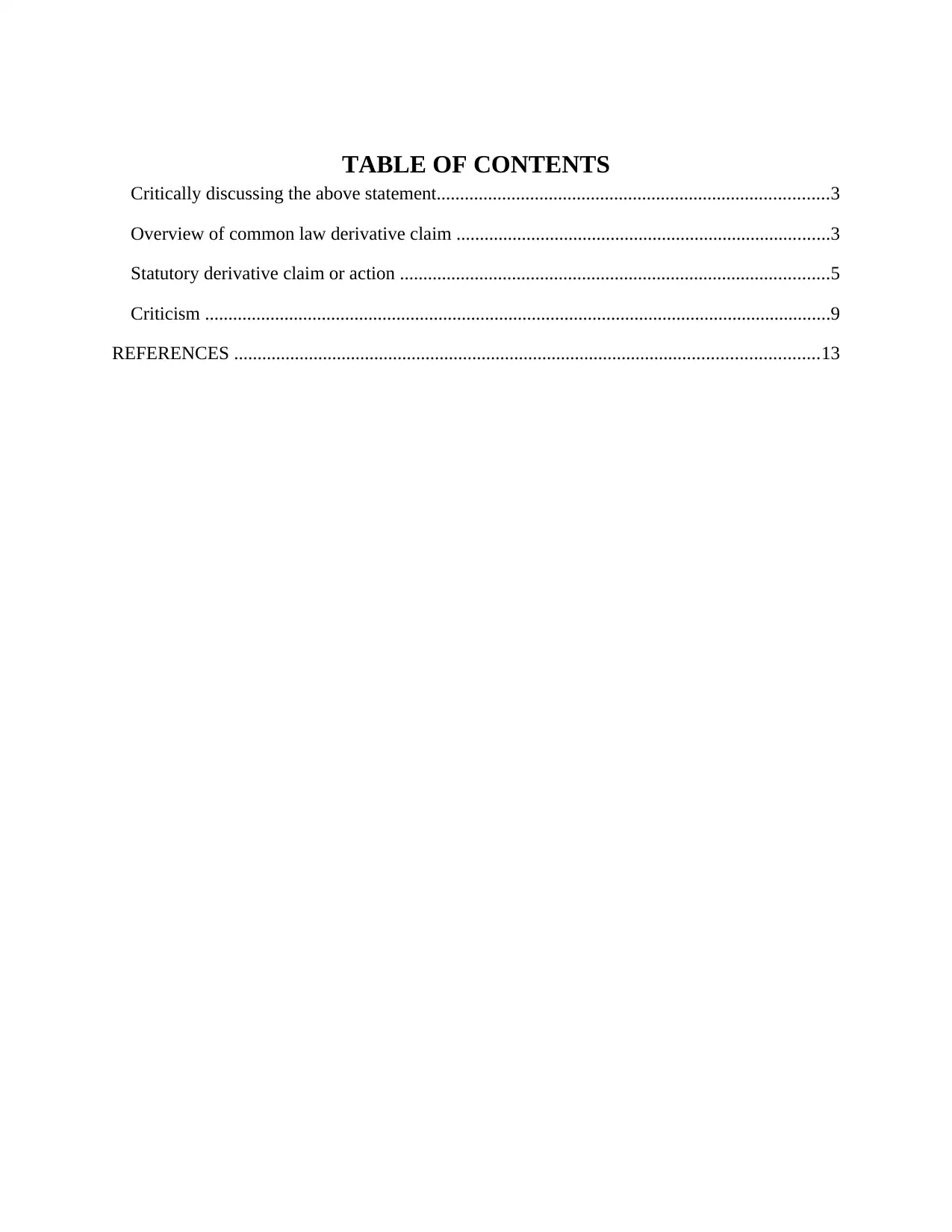
TABLE OF CONTENTS
Critically discussing the above statement....................................................................................3
Overview of common law derivative claim ................................................................................3
Statutory derivative claim or action ............................................................................................5
Criticism ......................................................................................................................................9
REFERENCES .............................................................................................................................13
Critically discussing the above statement....................................................................................3
Overview of common law derivative claim ................................................................................3
Statutory derivative claim or action ............................................................................................5
Criticism ......................................................................................................................................9
REFERENCES .............................................................................................................................13

Topic: ‘The statutory derivative claim provides a much more practical remedy compared to the
common law derivative action and in general it constitutes an improvement in the protection
afforded to minority shareholders’.
Critically discussing the above statement
Companies Act (2006), contains several rules and regulations that assists in managing
business affairs more effectually. Derivative actions imply for the claims that are made by
individual shareholders who are dealing on the behalf of the company. Hence, it implies that
shareholders can claim for the fraud on the minority associated with the director’s action.
Current statutory derivative claim may only be brought where complaint regarding wrongdoing
cannot be ratified or sanctioned through the means of ordinary resolution. As per the legal
aspects, derivative actions will also be applied on alleged breaches of new duties related to
director such as reasonable care, skill and diligence. Statutory derivative action may be served as
a reform over common aspects. Common law entails that shareholders cannot make sue or
complaint pertaining to the internal irregularities. Hence, the present report will shed light on the
extent to which aspects related to statutory derivative are highly practical over common law
practices. Further, it also provides deeper insight about the manner in which statutory derivative
claim improves protection level of minority shareholders.
Overview of common law derivative claim
Common law derivative entails that an individual shareholder cannot make sue or
compliant regarding company’s wrongdoing and internal irregularities. Such principle of
common law is recognized as the rule derived through the case of Foss V Harbottle. Under such
case, two shareholders have taken legal action in against to the promoters and directors of
business unit. In this, concerned shareholders has made allegation on the directors that they had
used company’s assets and mortgaged property in inappropriate manner. In this, appeal of such
two stakeholders was rejected on the ground that for the company’s undesirable activities or
actions it alone could sue1. Hence, in other words, as per such case it can be mentioned that
1
common law derivative action and in general it constitutes an improvement in the protection
afforded to minority shareholders’.
Critically discussing the above statement
Companies Act (2006), contains several rules and regulations that assists in managing
business affairs more effectually. Derivative actions imply for the claims that are made by
individual shareholders who are dealing on the behalf of the company. Hence, it implies that
shareholders can claim for the fraud on the minority associated with the director’s action.
Current statutory derivative claim may only be brought where complaint regarding wrongdoing
cannot be ratified or sanctioned through the means of ordinary resolution. As per the legal
aspects, derivative actions will also be applied on alleged breaches of new duties related to
director such as reasonable care, skill and diligence. Statutory derivative action may be served as
a reform over common aspects. Common law entails that shareholders cannot make sue or
complaint pertaining to the internal irregularities. Hence, the present report will shed light on the
extent to which aspects related to statutory derivative are highly practical over common law
practices. Further, it also provides deeper insight about the manner in which statutory derivative
claim improves protection level of minority shareholders.
Overview of common law derivative claim
Common law derivative entails that an individual shareholder cannot make sue or
compliant regarding company’s wrongdoing and internal irregularities. Such principle of
common law is recognized as the rule derived through the case of Foss V Harbottle. Under such
case, two shareholders have taken legal action in against to the promoters and directors of
business unit. In this, concerned shareholders has made allegation on the directors that they had
used company’s assets and mortgaged property in inappropriate manner. In this, appeal of such
two stakeholders was rejected on the ground that for the company’s undesirable activities or
actions it alone could sue1. Hence, in other words, as per such case it can be mentioned that
1
⊘ This is a preview!⊘
Do you want full access?
Subscribe today to unlock all pages.

Trusted by 1+ million students worldwide
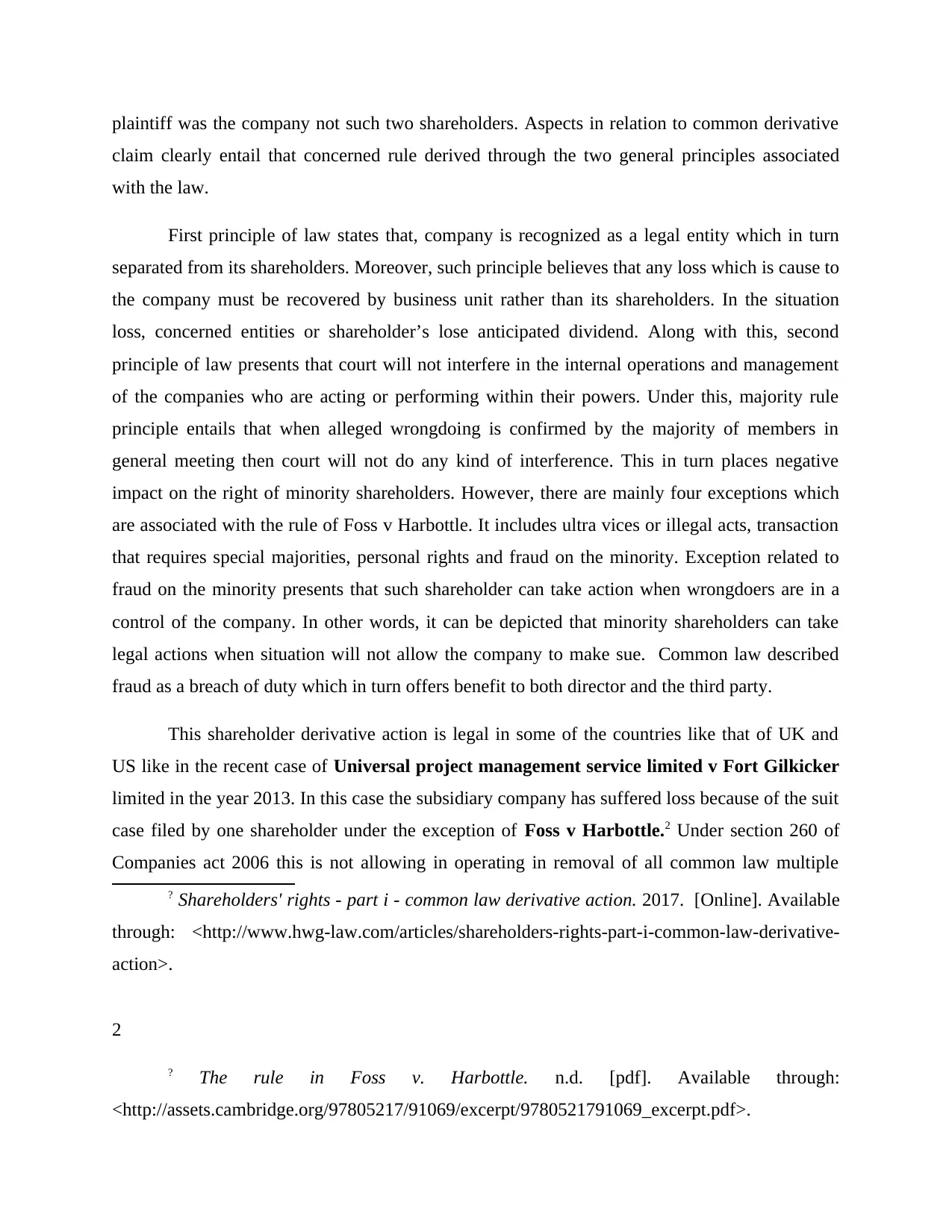
plaintiff was the company not such two shareholders. Aspects in relation to common derivative
claim clearly entail that concerned rule derived through the two general principles associated
with the law.
First principle of law states that, company is recognized as a legal entity which in turn
separated from its shareholders. Moreover, such principle believes that any loss which is cause to
the company must be recovered by business unit rather than its shareholders. In the situation
loss, concerned entities or shareholder’s lose anticipated dividend. Along with this, second
principle of law presents that court will not interfere in the internal operations and management
of the companies who are acting or performing within their powers. Under this, majority rule
principle entails that when alleged wrongdoing is confirmed by the majority of members in
general meeting then court will not do any kind of interference. This in turn places negative
impact on the right of minority shareholders. However, there are mainly four exceptions which
are associated with the rule of Foss v Harbottle. It includes ultra vices or illegal acts, transaction
that requires special majorities, personal rights and fraud on the minority. Exception related to
fraud on the minority presents that such shareholder can take action when wrongdoers are in a
control of the company. In other words, it can be depicted that minority shareholders can take
legal actions when situation will not allow the company to make sue. Common law described
fraud as a breach of duty which in turn offers benefit to both director and the third party.
This shareholder derivative action is legal in some of the countries like that of UK and
US like in the recent case of Universal project management service limited v Fort Gilkicker
limited in the year 2013. In this case the subsidiary company has suffered loss because of the suit
case filed by one shareholder under the exception of Foss v Harbottle.2 Under section 260 of
Companies act 2006 this is not allowing in operating in removal of all common law multiple
? Shareholders' rights - part i - common law derivative action. 2017. [Online]. Available
through: <http://www.hwg-law.com/articles/shareholders-rights-part-i-common-law-derivative-
action>.
2
? The rule in Foss v. Harbottle. n.d. [pdf]. Available through:
<http://assets.cambridge.org/97805217/91069/excerpt/9780521791069_excerpt.pdf>.
claim clearly entail that concerned rule derived through the two general principles associated
with the law.
First principle of law states that, company is recognized as a legal entity which in turn
separated from its shareholders. Moreover, such principle believes that any loss which is cause to
the company must be recovered by business unit rather than its shareholders. In the situation
loss, concerned entities or shareholder’s lose anticipated dividend. Along with this, second
principle of law presents that court will not interfere in the internal operations and management
of the companies who are acting or performing within their powers. Under this, majority rule
principle entails that when alleged wrongdoing is confirmed by the majority of members in
general meeting then court will not do any kind of interference. This in turn places negative
impact on the right of minority shareholders. However, there are mainly four exceptions which
are associated with the rule of Foss v Harbottle. It includes ultra vices or illegal acts, transaction
that requires special majorities, personal rights and fraud on the minority. Exception related to
fraud on the minority presents that such shareholder can take action when wrongdoers are in a
control of the company. In other words, it can be depicted that minority shareholders can take
legal actions when situation will not allow the company to make sue. Common law described
fraud as a breach of duty which in turn offers benefit to both director and the third party.
This shareholder derivative action is legal in some of the countries like that of UK and
US like in the recent case of Universal project management service limited v Fort Gilkicker
limited in the year 2013. In this case the subsidiary company has suffered loss because of the suit
case filed by one shareholder under the exception of Foss v Harbottle.2 Under section 260 of
Companies act 2006 this is not allowing in operating in removal of all common law multiple
? Shareholders' rights - part i - common law derivative action. 2017. [Online]. Available
through: <http://www.hwg-law.com/articles/shareholders-rights-part-i-common-law-derivative-
action>.
2
? The rule in Foss v. Harbottle. n.d. [pdf]. Available through:
<http://assets.cambridge.org/97805217/91069/excerpt/9780521791069_excerpt.pdf>.
Paraphrase This Document
Need a fresh take? Get an instant paraphrase of this document with our AI Paraphraser

derivative action. In multiple derivatives as stated that both company and its shareholder are
different from each other having their own rights and liabilities. If there is any harm to property
or assets of that company then it is the one who will take action not the shareholder. In the above
mentioned case of Universal project management service limited v Fort Gilkicker limited the
company was a limited liability partnership. Where both the claimant and wrongdoers were at
same sharing of 50% each in company. This position was like in that way in which wrongdoers
were not able to prevent LLP to sue the company.
In the other case of Franbar Holding ltd v Patel and others in the year 2008 in the short
term derivative claim is that if any shareholder is suing the name of company or minority
shareholder they can sue it in four different ways.
First is in the form of personal right in this the constitution or general law is breached.
Under this if a single shareholder is claiming about the loss made to him in by company then he
will not be able to bring the company in the court of law. If they are suffering from the loss of
only reduction of share value for this single loss which is called as losses reflective only
derivative claim could be bought.
Statutory derivative claim or action
Section 260-264 of Companies Act (2006) is highly associated with the aspect of
statutory derivative claim. According to section 260, claim pertaining to derivative can brought
when it arises from actual or proposed action. Hence, such actions or omission mainly include
negligence, breach of duty or trust by the director of a company. From assessment, it has found
that section 260 (5) clearly entails that member of a company include a person or individual to
whom shares are transmitted through operation of law. Section 260 pertaining to Companies Act
(2006) clearly reflects that claim regarding derivatives can be made in against to both former as
well as shadow director and another person. However, one cannot make claim in against to the
third parties like an auditor because only board members possess right regarding sue on him/her.
Nevertheless, in case when board takes decision in relation to not suing against to an auditor
regarding derivative claim then it is considered or recognized as breach of duty.
different from each other having their own rights and liabilities. If there is any harm to property
or assets of that company then it is the one who will take action not the shareholder. In the above
mentioned case of Universal project management service limited v Fort Gilkicker limited the
company was a limited liability partnership. Where both the claimant and wrongdoers were at
same sharing of 50% each in company. This position was like in that way in which wrongdoers
were not able to prevent LLP to sue the company.
In the other case of Franbar Holding ltd v Patel and others in the year 2008 in the short
term derivative claim is that if any shareholder is suing the name of company or minority
shareholder they can sue it in four different ways.
First is in the form of personal right in this the constitution or general law is breached.
Under this if a single shareholder is claiming about the loss made to him in by company then he
will not be able to bring the company in the court of law. If they are suffering from the loss of
only reduction of share value for this single loss which is called as losses reflective only
derivative claim could be bought.
Statutory derivative claim or action
Section 260-264 of Companies Act (2006) is highly associated with the aspect of
statutory derivative claim. According to section 260, claim pertaining to derivative can brought
when it arises from actual or proposed action. Hence, such actions or omission mainly include
negligence, breach of duty or trust by the director of a company. From assessment, it has found
that section 260 (5) clearly entails that member of a company include a person or individual to
whom shares are transmitted through operation of law. Section 260 pertaining to Companies Act
(2006) clearly reflects that claim regarding derivatives can be made in against to both former as
well as shadow director and another person. However, one cannot make claim in against to the
third parties like an auditor because only board members possess right regarding sue on him/her.
Nevertheless, in case when board takes decision in relation to not suing against to an auditor
regarding derivative claim then it is considered or recognized as breach of duty.
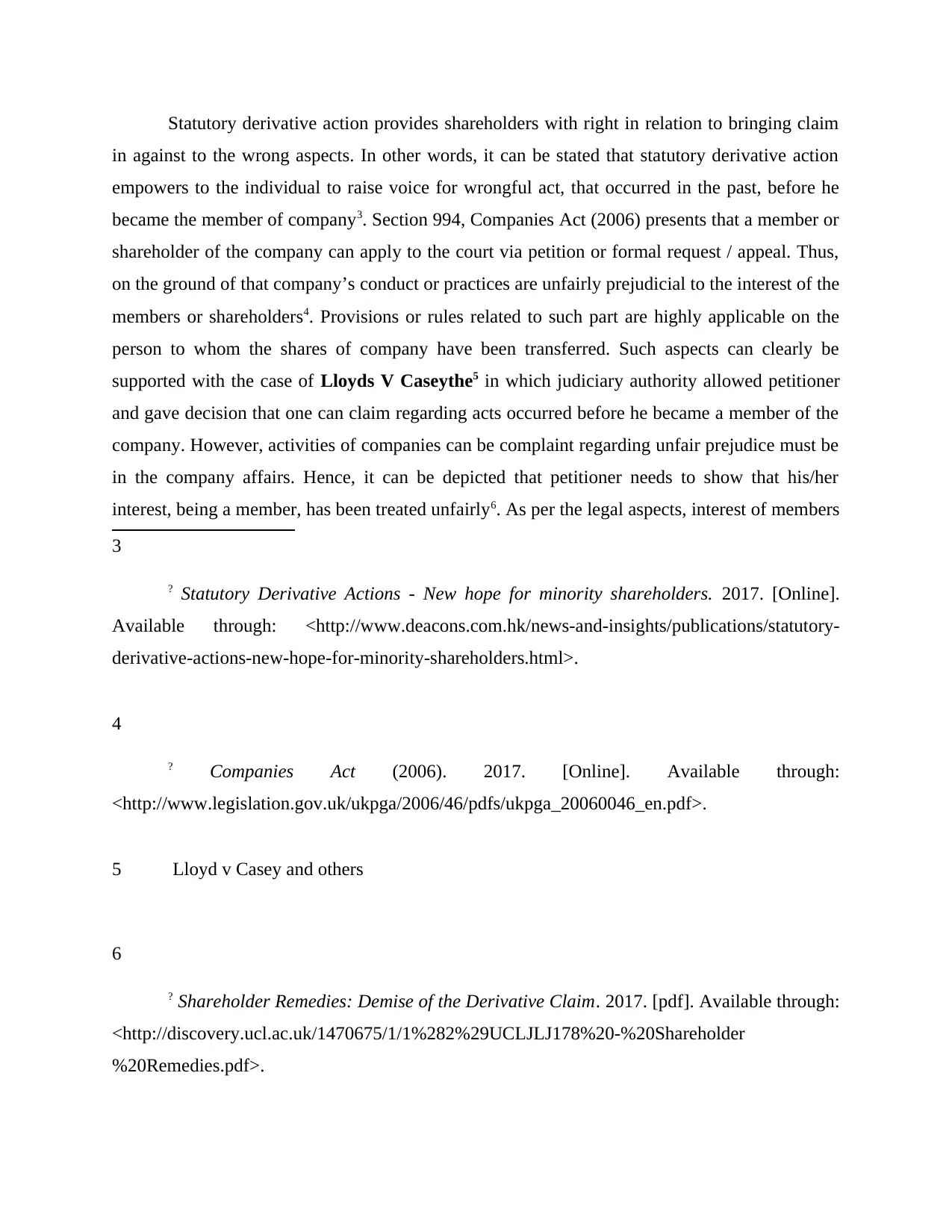
Statutory derivative action provides shareholders with right in relation to bringing claim
in against to the wrong aspects. In other words, it can be stated that statutory derivative action
empowers to the individual to raise voice for wrongful act, that occurred in the past, before he
became the member of company3. Section 994, Companies Act (2006) presents that a member or
shareholder of the company can apply to the court via petition or formal request / appeal. Thus,
on the ground of that company’s conduct or practices are unfairly prejudicial to the interest of the
members or shareholders4. Provisions or rules related to such part are highly applicable on the
person to whom the shares of company have been transferred. Such aspects can clearly be
supported with the case of Lloyds V Caseythe5 in which judiciary authority allowed petitioner
and gave decision that one can claim regarding acts occurred before he became a member of the
company. However, activities of companies can be complaint regarding unfair prejudice must be
in the company affairs. Hence, it can be depicted that petitioner needs to show that his/her
interest, being a member, has been treated unfairly6. As per the legal aspects, interest of members
3
? Statutory Derivative Actions - New hope for minority shareholders. 2017. [Online].
Available through: <http://www.deacons.com.hk/news-and-insights/publications/statutory-
derivative-actions-new-hope-for-minority-shareholders.html>.
4
? Companies Act (2006). 2017. [Online]. Available through:
<http://www.legislation.gov.uk/ukpga/2006/46/pdfs/ukpga_20060046_en.pdf>.
5 Lloyd v Casey and others
6
? Shareholder Remedies: Demise of the Derivative Claim. 2017. [pdf]. Available through:
<http://discovery.ucl.ac.uk/1470675/1/1%282%29UCLJLJ178%20-%20Shareholder
%20Remedies.pdf>.
in against to the wrong aspects. In other words, it can be stated that statutory derivative action
empowers to the individual to raise voice for wrongful act, that occurred in the past, before he
became the member of company3. Section 994, Companies Act (2006) presents that a member or
shareholder of the company can apply to the court via petition or formal request / appeal. Thus,
on the ground of that company’s conduct or practices are unfairly prejudicial to the interest of the
members or shareholders4. Provisions or rules related to such part are highly applicable on the
person to whom the shares of company have been transferred. Such aspects can clearly be
supported with the case of Lloyds V Caseythe5 in which judiciary authority allowed petitioner
and gave decision that one can claim regarding acts occurred before he became a member of the
company. However, activities of companies can be complaint regarding unfair prejudice must be
in the company affairs. Hence, it can be depicted that petitioner needs to show that his/her
interest, being a member, has been treated unfairly6. As per the legal aspects, interest of members
3
? Statutory Derivative Actions - New hope for minority shareholders. 2017. [Online].
Available through: <http://www.deacons.com.hk/news-and-insights/publications/statutory-
derivative-actions-new-hope-for-minority-shareholders.html>.
4
? Companies Act (2006). 2017. [Online]. Available through:
<http://www.legislation.gov.uk/ukpga/2006/46/pdfs/ukpga_20060046_en.pdf>.
5 Lloyd v Casey and others
6
? Shareholder Remedies: Demise of the Derivative Claim. 2017. [pdf]. Available through:
<http://discovery.ucl.ac.uk/1470675/1/1%282%29UCLJLJ178%20-%20Shareholder
%20Remedies.pdf>.
⊘ This is a preview!⊘
Do you want full access?
Subscribe today to unlock all pages.

Trusted by 1+ million students worldwide
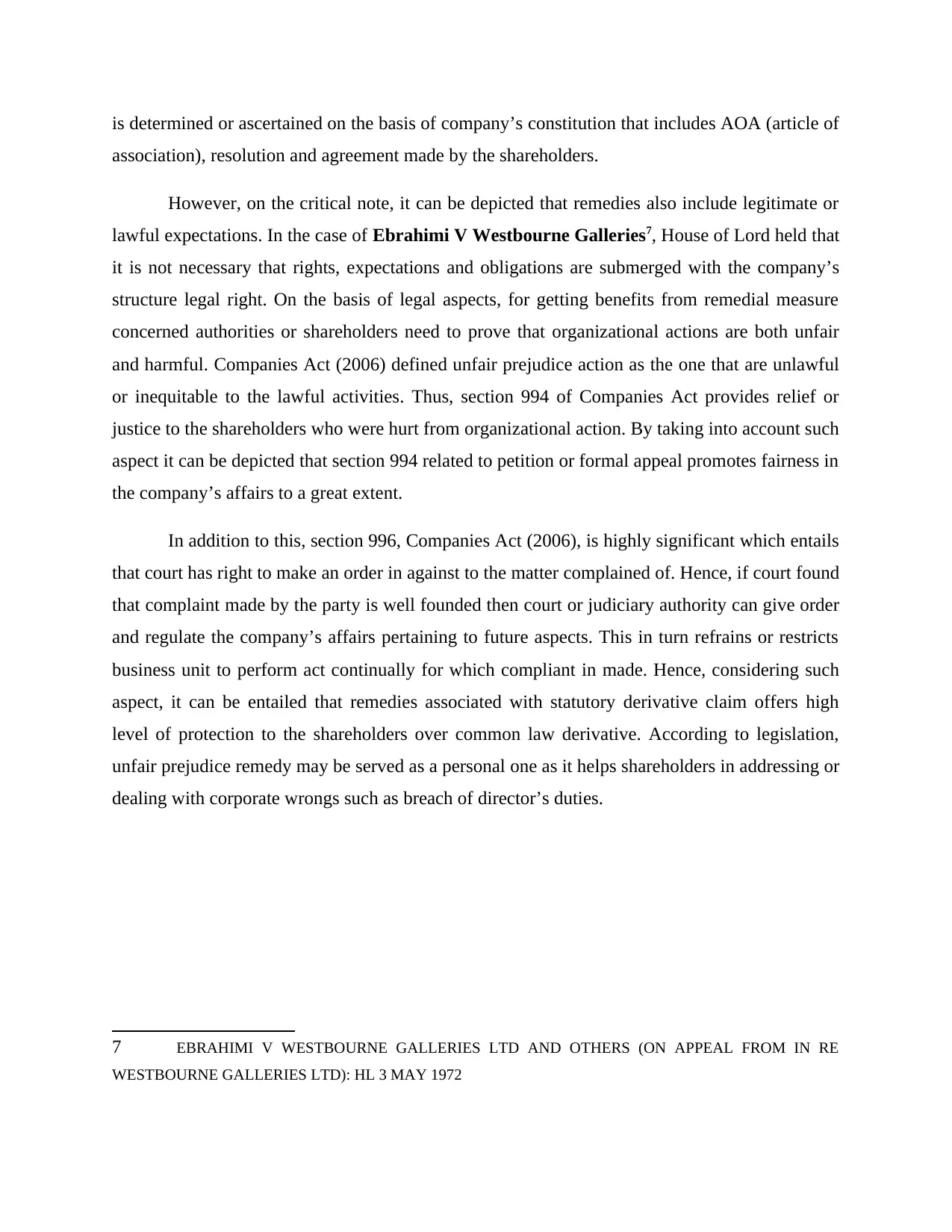
is determined or ascertained on the basis of company’s constitution that includes AOA (article of
association), resolution and agreement made by the shareholders.
However, on the critical note, it can be depicted that remedies also include legitimate or
lawful expectations. In the case of Ebrahimi V Westbourne Galleries7, House of Lord held that
it is not necessary that rights, expectations and obligations are submerged with the company’s
structure legal right. On the basis of legal aspects, for getting benefits from remedial measure
concerned authorities or shareholders need to prove that organizational actions are both unfair
and harmful. Companies Act (2006) defined unfair prejudice action as the one that are unlawful
or inequitable to the lawful activities. Thus, section 994 of Companies Act provides relief or
justice to the shareholders who were hurt from organizational action. By taking into account such
aspect it can be depicted that section 994 related to petition or formal appeal promotes fairness in
the company’s affairs to a great extent.
In addition to this, section 996, Companies Act (2006), is highly significant which entails
that court has right to make an order in against to the matter complained of. Hence, if court found
that complaint made by the party is well founded then court or judiciary authority can give order
and regulate the company’s affairs pertaining to future aspects. This in turn refrains or restricts
business unit to perform act continually for which compliant in made. Hence, considering such
aspect, it can be entailed that remedies associated with statutory derivative claim offers high
level of protection to the shareholders over common law derivative. According to legislation,
unfair prejudice remedy may be served as a personal one as it helps shareholders in addressing or
dealing with corporate wrongs such as breach of director’s duties.
7 EBRAHIMI V WESTBOURNE GALLERIES LTD AND OTHERS (ON APPEAL FROM IN RE
WESTBOURNE GALLERIES LTD): HL 3 MAY 1972
association), resolution and agreement made by the shareholders.
However, on the critical note, it can be depicted that remedies also include legitimate or
lawful expectations. In the case of Ebrahimi V Westbourne Galleries7, House of Lord held that
it is not necessary that rights, expectations and obligations are submerged with the company’s
structure legal right. On the basis of legal aspects, for getting benefits from remedial measure
concerned authorities or shareholders need to prove that organizational actions are both unfair
and harmful. Companies Act (2006) defined unfair prejudice action as the one that are unlawful
or inequitable to the lawful activities. Thus, section 994 of Companies Act provides relief or
justice to the shareholders who were hurt from organizational action. By taking into account such
aspect it can be depicted that section 994 related to petition or formal appeal promotes fairness in
the company’s affairs to a great extent.
In addition to this, section 996, Companies Act (2006), is highly significant which entails
that court has right to make an order in against to the matter complained of. Hence, if court found
that complaint made by the party is well founded then court or judiciary authority can give order
and regulate the company’s affairs pertaining to future aspects. This in turn refrains or restricts
business unit to perform act continually for which compliant in made. Hence, considering such
aspect, it can be entailed that remedies associated with statutory derivative claim offers high
level of protection to the shareholders over common law derivative. According to legislation,
unfair prejudice remedy may be served as a personal one as it helps shareholders in addressing or
dealing with corporate wrongs such as breach of director’s duties.
7 EBRAHIMI V WESTBOURNE GALLERIES LTD AND OTHERS (ON APPEAL FROM IN RE
WESTBOURNE GALLERIES LTD): HL 3 MAY 1972
Paraphrase This Document
Need a fresh take? Get an instant paraphrase of this document with our AI Paraphraser

Under the case of Clark v Cutland8, it was assessed that relief or protection can be
attained regarding corporate wrongdoing / undesirable actions. Along with this, case summary of
Atlasview Ltd v Brightview Ltd9 presents that court gave judgment in the favor of
shareholders. Moreover, in this, judicial authority found that company’s activities are not in the
favor of respective members. Thus, it can be mentioned that as per statutory common derivative
petitioner can obtain relief when the activities of the company are wrong10. From overall
evaluation, it has identified that provision regarding unfair prejudice enables innocent parties or
members to take action against firm’s wrongdoing.
Section 260-264 of Companies act 2006
Under the section 261 of the act in which there is stated the application for permission to
continue derivative claim if the court don not find the application evident and are not disclosing
true and prima facie case then it is the duty of court to dismiss the case. On the other hand if
court finds the evidence and application in support to claimant they may give the direction to
adjourn the proceeding.
Under the section 262 which is the application for permission to continue claim as
derivative claim will be mentioning cause of action. If the company fails to prosecute the claim
then on that ground court will allow member of company to apply to court. Once claimant has
given the application to court then they will grant them permission ot continues the claim or they
can refuse as well.
8 Clark v Cutland [2003] EWCA Civ 810; [2004] 1 W.L.R. 783; [2003] 4 All E.R. 733; [2004] B.C.C. 27;
[2003] 2 B.C.L.C. 393; [2003] O.P.L.R. 343; [2003] Pens. L.R. 179; [2004] W.T.L.R. 629; [2003] W.T.L.R. 1413;
(2003) 147 S.J.L.B. 781
9
10
? When will the court allow a common law derivative action on behalf of a company.
2017. [Online]. Available through: <https://www.lexology.com/library/detail.aspx?g=0b093eec-
11e5-4b01-8357-3e67d50c8604>.
attained regarding corporate wrongdoing / undesirable actions. Along with this, case summary of
Atlasview Ltd v Brightview Ltd9 presents that court gave judgment in the favor of
shareholders. Moreover, in this, judicial authority found that company’s activities are not in the
favor of respective members. Thus, it can be mentioned that as per statutory common derivative
petitioner can obtain relief when the activities of the company are wrong10. From overall
evaluation, it has identified that provision regarding unfair prejudice enables innocent parties or
members to take action against firm’s wrongdoing.
Section 260-264 of Companies act 2006
Under the section 261 of the act in which there is stated the application for permission to
continue derivative claim if the court don not find the application evident and are not disclosing
true and prima facie case then it is the duty of court to dismiss the case. On the other hand if
court finds the evidence and application in support to claimant they may give the direction to
adjourn the proceeding.
Under the section 262 which is the application for permission to continue claim as
derivative claim will be mentioning cause of action. If the company fails to prosecute the claim
then on that ground court will allow member of company to apply to court. Once claimant has
given the application to court then they will grant them permission ot continues the claim or they
can refuse as well.
8 Clark v Cutland [2003] EWCA Civ 810; [2004] 1 W.L.R. 783; [2003] 4 All E.R. 733; [2004] B.C.C. 27;
[2003] 2 B.C.L.C. 393; [2003] O.P.L.R. 343; [2003] Pens. L.R. 179; [2004] W.T.L.R. 629; [2003] W.T.L.R. 1413;
(2003) 147 S.J.L.B. 781
9
10
? When will the court allow a common law derivative action on behalf of a company.
2017. [Online]. Available through: <https://www.lexology.com/library/detail.aspx?g=0b093eec-
11e5-4b01-8357-3e67d50c8604>.
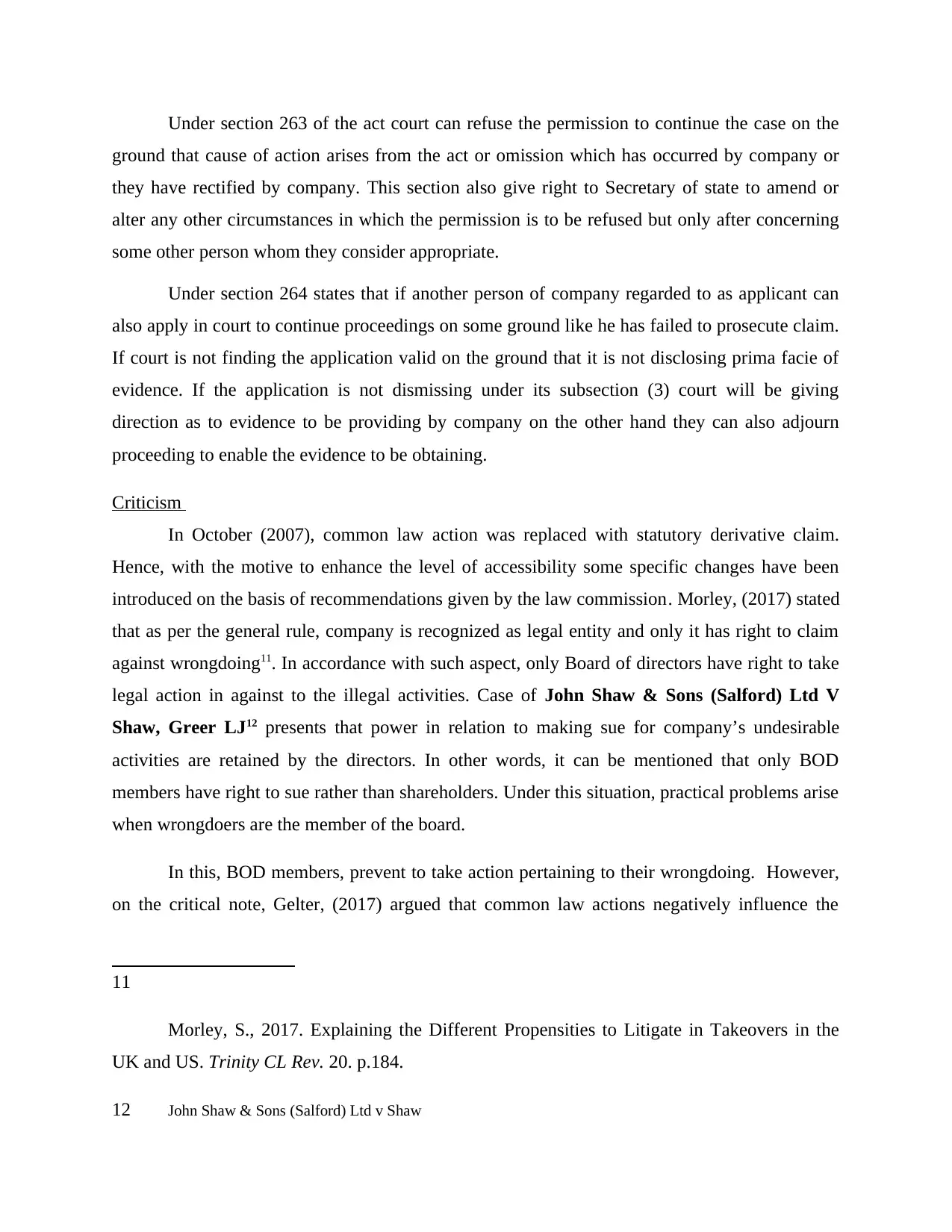
Under section 263 of the act court can refuse the permission to continue the case on the
ground that cause of action arises from the act or omission which has occurred by company or
they have rectified by company. This section also give right to Secretary of state to amend or
alter any other circumstances in which the permission is to be refused but only after concerning
some other person whom they consider appropriate.
Under section 264 states that if another person of company regarded to as applicant can
also apply in court to continue proceedings on some ground like he has failed to prosecute claim.
If court is not finding the application valid on the ground that it is not disclosing prima facie of
evidence. If the application is not dismissing under its subsection (3) court will be giving
direction as to evidence to be providing by company on the other hand they can also adjourn
proceeding to enable the evidence to be obtaining.
Criticism
In October (2007), common law action was replaced with statutory derivative claim.
Hence, with the motive to enhance the level of accessibility some specific changes have been
introduced on the basis of recommendations given by the law commission. Morley, (2017) stated
that as per the general rule, company is recognized as legal entity and only it has right to claim
against wrongdoing11. In accordance with such aspect, only Board of directors have right to take
legal action in against to the illegal activities. Case of John Shaw & Sons (Salford) Ltd V
Shaw, Greer LJ12 presents that power in relation to making sue for company’s undesirable
activities are retained by the directors. In other words, it can be mentioned that only BOD
members have right to sue rather than shareholders. Under this situation, practical problems arise
when wrongdoers are the member of the board.
In this, BOD members, prevent to take action pertaining to their wrongdoing. However,
on the critical note, Gelter, (2017) argued that common law actions negatively influence the
11
Morley, S., 2017. Explaining the Different Propensities to Litigate in Takeovers in the
UK and US. Trinity CL Rev. 20. p.184.
12 John Shaw & Sons (Salford) Ltd v Shaw
ground that cause of action arises from the act or omission which has occurred by company or
they have rectified by company. This section also give right to Secretary of state to amend or
alter any other circumstances in which the permission is to be refused but only after concerning
some other person whom they consider appropriate.
Under section 264 states that if another person of company regarded to as applicant can
also apply in court to continue proceedings on some ground like he has failed to prosecute claim.
If court is not finding the application valid on the ground that it is not disclosing prima facie of
evidence. If the application is not dismissing under its subsection (3) court will be giving
direction as to evidence to be providing by company on the other hand they can also adjourn
proceeding to enable the evidence to be obtaining.
Criticism
In October (2007), common law action was replaced with statutory derivative claim.
Hence, with the motive to enhance the level of accessibility some specific changes have been
introduced on the basis of recommendations given by the law commission. Morley, (2017) stated
that as per the general rule, company is recognized as legal entity and only it has right to claim
against wrongdoing11. In accordance with such aspect, only Board of directors have right to take
legal action in against to the illegal activities. Case of John Shaw & Sons (Salford) Ltd V
Shaw, Greer LJ12 presents that power in relation to making sue for company’s undesirable
activities are retained by the directors. In other words, it can be mentioned that only BOD
members have right to sue rather than shareholders. Under this situation, practical problems arise
when wrongdoers are the member of the board.
In this, BOD members, prevent to take action pertaining to their wrongdoing. However,
on the critical note, Gelter, (2017) argued that common law actions negatively influence the
11
Morley, S., 2017. Explaining the Different Propensities to Litigate in Takeovers in the
UK and US. Trinity CL Rev. 20. p.184.
12 John Shaw & Sons (Salford) Ltd v Shaw
⊘ This is a preview!⊘
Do you want full access?
Subscribe today to unlock all pages.

Trusted by 1+ million students worldwide
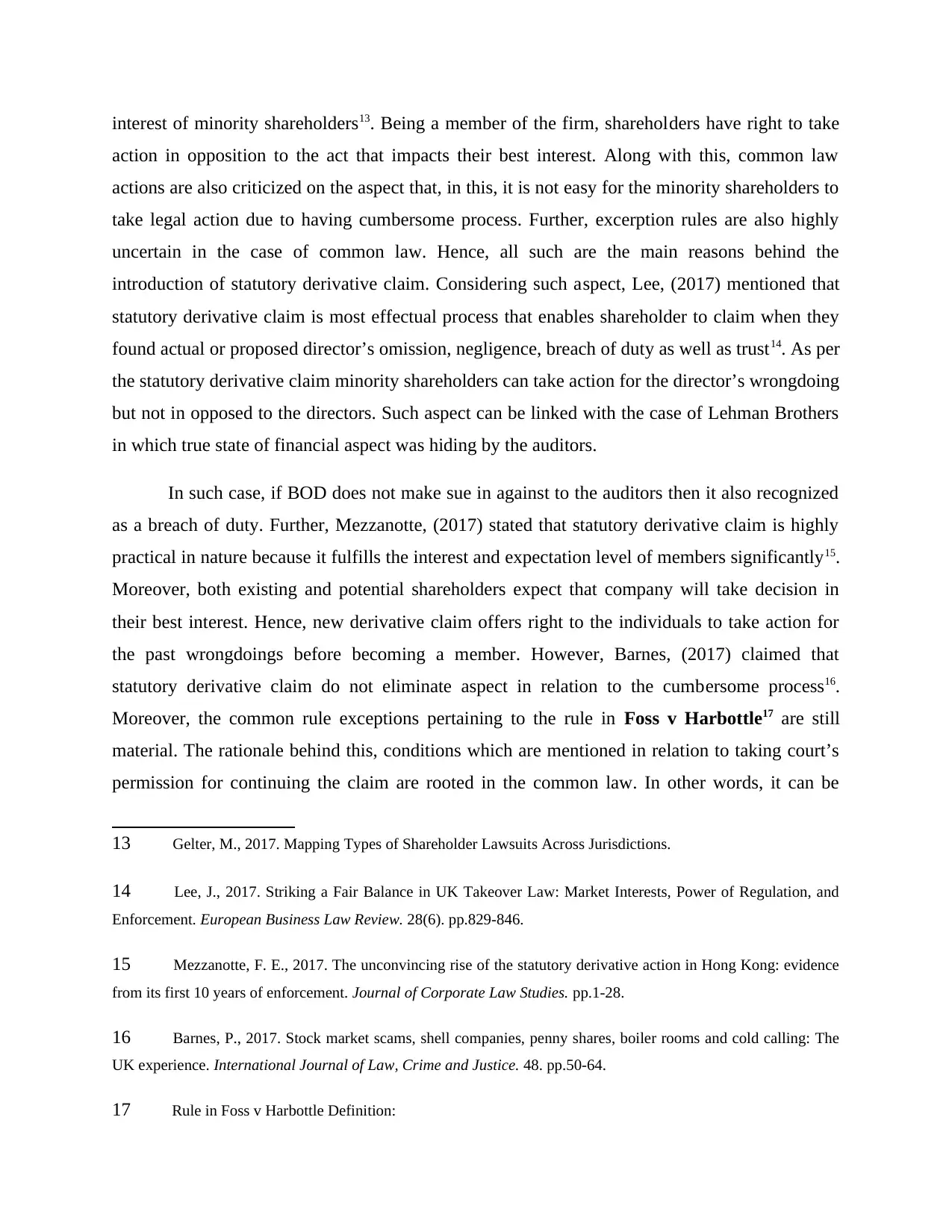
interest of minority shareholders13. Being a member of the firm, shareholders have right to take
action in opposition to the act that impacts their best interest. Along with this, common law
actions are also criticized on the aspect that, in this, it is not easy for the minority shareholders to
take legal action due to having cumbersome process. Further, excerption rules are also highly
uncertain in the case of common law. Hence, all such are the main reasons behind the
introduction of statutory derivative claim. Considering such aspect, Lee, (2017) mentioned that
statutory derivative claim is most effectual process that enables shareholder to claim when they
found actual or proposed director’s omission, negligence, breach of duty as well as trust14. As per
the statutory derivative claim minority shareholders can take action for the director’s wrongdoing
but not in opposed to the directors. Such aspect can be linked with the case of Lehman Brothers
in which true state of financial aspect was hiding by the auditors.
In such case, if BOD does not make sue in against to the auditors then it also recognized
as a breach of duty. Further, Mezzanotte, (2017) stated that statutory derivative claim is highly
practical in nature because it fulfills the interest and expectation level of members significantly15.
Moreover, both existing and potential shareholders expect that company will take decision in
their best interest. Hence, new derivative claim offers right to the individuals to take action for
the past wrongdoings before becoming a member. However, Barnes, (2017) claimed that
statutory derivative claim do not eliminate aspect in relation to the cumbersome process16.
Moreover, the common rule exceptions pertaining to the rule in Foss v Harbottle17 are still
material. The rationale behind this, conditions which are mentioned in relation to taking court’s
permission for continuing the claim are rooted in the common law. In other words, it can be
13 Gelter, M., 2017. Mapping Types of Shareholder Lawsuits Across Jurisdictions.
14 Lee, J., 2017. Striking a Fair Balance in UK Takeover Law: Market Interests, Power of Regulation, and
Enforcement. European Business Law Review. 28(6). pp.829-846.
15 Mezzanotte, F. E., 2017. The unconvincing rise of the statutory derivative action in Hong Kong: evidence
from its first 10 years of enforcement. Journal of Corporate Law Studies. pp.1-28.
16 Barnes, P., 2017. Stock market scams, shell companies, penny shares, boiler rooms and cold calling: The
UK experience. International Journal of Law, Crime and Justice. 48. pp.50-64.
17 Rule in Foss v Harbottle Definition:
action in opposition to the act that impacts their best interest. Along with this, common law
actions are also criticized on the aspect that, in this, it is not easy for the minority shareholders to
take legal action due to having cumbersome process. Further, excerption rules are also highly
uncertain in the case of common law. Hence, all such are the main reasons behind the
introduction of statutory derivative claim. Considering such aspect, Lee, (2017) mentioned that
statutory derivative claim is most effectual process that enables shareholder to claim when they
found actual or proposed director’s omission, negligence, breach of duty as well as trust14. As per
the statutory derivative claim minority shareholders can take action for the director’s wrongdoing
but not in opposed to the directors. Such aspect can be linked with the case of Lehman Brothers
in which true state of financial aspect was hiding by the auditors.
In such case, if BOD does not make sue in against to the auditors then it also recognized
as a breach of duty. Further, Mezzanotte, (2017) stated that statutory derivative claim is highly
practical in nature because it fulfills the interest and expectation level of members significantly15.
Moreover, both existing and potential shareholders expect that company will take decision in
their best interest. Hence, new derivative claim offers right to the individuals to take action for
the past wrongdoings before becoming a member. However, Barnes, (2017) claimed that
statutory derivative claim do not eliminate aspect in relation to the cumbersome process16.
Moreover, the common rule exceptions pertaining to the rule in Foss v Harbottle17 are still
material. The rationale behind this, conditions which are mentioned in relation to taking court’s
permission for continuing the claim are rooted in the common law. In other words, it can be
13 Gelter, M., 2017. Mapping Types of Shareholder Lawsuits Across Jurisdictions.
14 Lee, J., 2017. Striking a Fair Balance in UK Takeover Law: Market Interests, Power of Regulation, and
Enforcement. European Business Law Review. 28(6). pp.829-846.
15 Mezzanotte, F. E., 2017. The unconvincing rise of the statutory derivative action in Hong Kong: evidence
from its first 10 years of enforcement. Journal of Corporate Law Studies. pp.1-28.
16 Barnes, P., 2017. Stock market scams, shell companies, penny shares, boiler rooms and cold calling: The
UK experience. International Journal of Law, Crime and Justice. 48. pp.50-64.
17 Rule in Foss v Harbottle Definition:
Paraphrase This Document
Need a fresh take? Get an instant paraphrase of this document with our AI Paraphraser
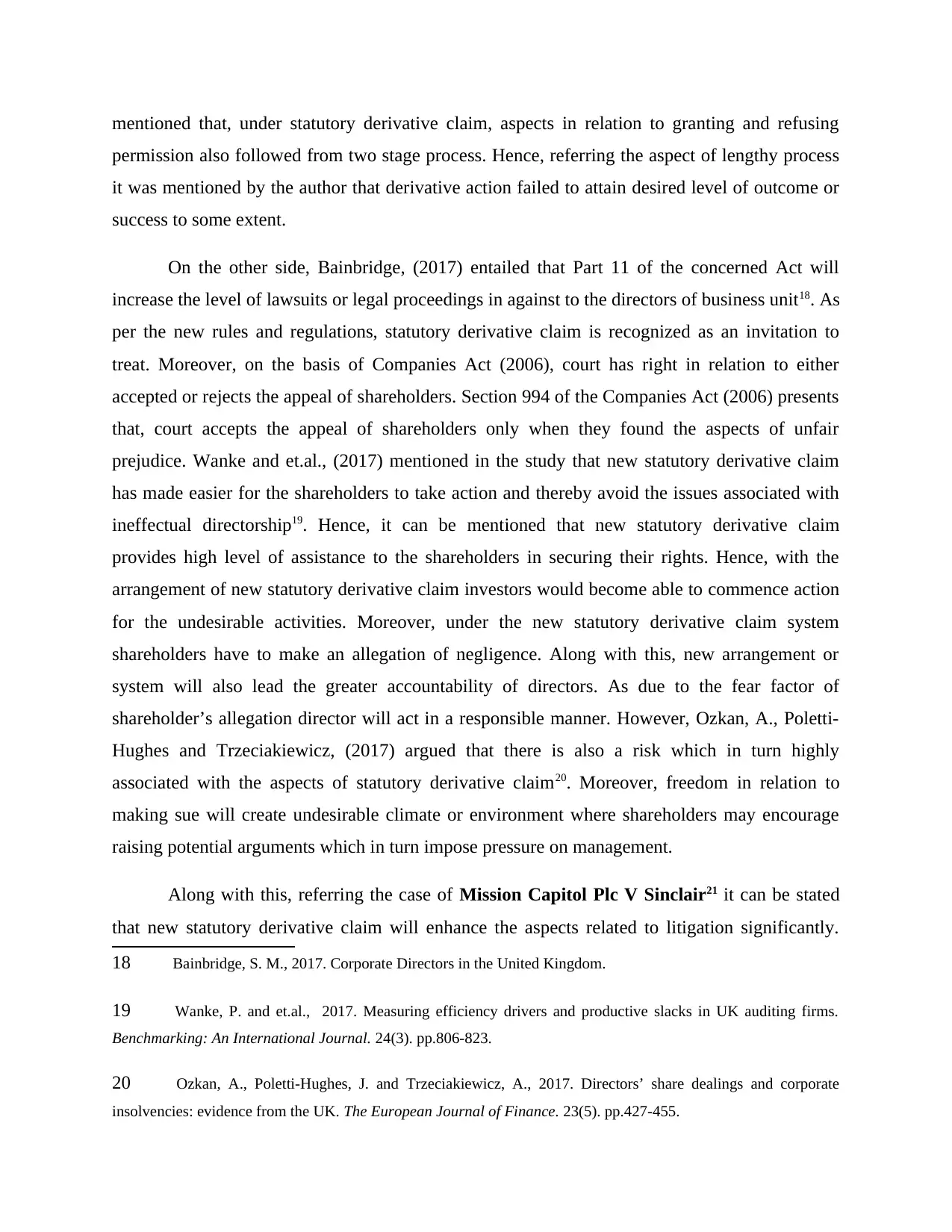
mentioned that, under statutory derivative claim, aspects in relation to granting and refusing
permission also followed from two stage process. Hence, referring the aspect of lengthy process
it was mentioned by the author that derivative action failed to attain desired level of outcome or
success to some extent.
On the other side, Bainbridge, (2017) entailed that Part 11 of the concerned Act will
increase the level of lawsuits or legal proceedings in against to the directors of business unit18. As
per the new rules and regulations, statutory derivative claim is recognized as an invitation to
treat. Moreover, on the basis of Companies Act (2006), court has right in relation to either
accepted or rejects the appeal of shareholders. Section 994 of the Companies Act (2006) presents
that, court accepts the appeal of shareholders only when they found the aspects of unfair
prejudice. Wanke and et.al., (2017) mentioned in the study that new statutory derivative claim
has made easier for the shareholders to take action and thereby avoid the issues associated with
ineffectual directorship19. Hence, it can be mentioned that new statutory derivative claim
provides high level of assistance to the shareholders in securing their rights. Hence, with the
arrangement of new statutory derivative claim investors would become able to commence action
for the undesirable activities. Moreover, under the new statutory derivative claim system
shareholders have to make an allegation of negligence. Along with this, new arrangement or
system will also lead the greater accountability of directors. As due to the fear factor of
shareholder’s allegation director will act in a responsible manner. However, Ozkan, A., Poletti-
Hughes and Trzeciakiewicz, (2017) argued that there is also a risk which in turn highly
associated with the aspects of statutory derivative claim20. Moreover, freedom in relation to
making sue will create undesirable climate or environment where shareholders may encourage
raising potential arguments which in turn impose pressure on management.
Along with this, referring the case of Mission Capitol Plc V Sinclair21 it can be stated
that new statutory derivative claim will enhance the aspects related to litigation significantly.
18 Bainbridge, S. M., 2017. Corporate Directors in the United Kingdom.
19 Wanke, P. and et.al., 2017. Measuring efficiency drivers and productive slacks in UK auditing firms.
Benchmarking: An International Journal. 24(3). pp.806-823.
20 Ozkan, A., Poletti-Hughes, J. and Trzeciakiewicz, A., 2017. Directors’ share dealings and corporate
insolvencies: evidence from the UK. The European Journal of Finance. 23(5). pp.427-455.
permission also followed from two stage process. Hence, referring the aspect of lengthy process
it was mentioned by the author that derivative action failed to attain desired level of outcome or
success to some extent.
On the other side, Bainbridge, (2017) entailed that Part 11 of the concerned Act will
increase the level of lawsuits or legal proceedings in against to the directors of business unit18. As
per the new rules and regulations, statutory derivative claim is recognized as an invitation to
treat. Moreover, on the basis of Companies Act (2006), court has right in relation to either
accepted or rejects the appeal of shareholders. Section 994 of the Companies Act (2006) presents
that, court accepts the appeal of shareholders only when they found the aspects of unfair
prejudice. Wanke and et.al., (2017) mentioned in the study that new statutory derivative claim
has made easier for the shareholders to take action and thereby avoid the issues associated with
ineffectual directorship19. Hence, it can be mentioned that new statutory derivative claim
provides high level of assistance to the shareholders in securing their rights. Hence, with the
arrangement of new statutory derivative claim investors would become able to commence action
for the undesirable activities. Moreover, under the new statutory derivative claim system
shareholders have to make an allegation of negligence. Along with this, new arrangement or
system will also lead the greater accountability of directors. As due to the fear factor of
shareholder’s allegation director will act in a responsible manner. However, Ozkan, A., Poletti-
Hughes and Trzeciakiewicz, (2017) argued that there is also a risk which in turn highly
associated with the aspects of statutory derivative claim20. Moreover, freedom in relation to
making sue will create undesirable climate or environment where shareholders may encourage
raising potential arguments which in turn impose pressure on management.
Along with this, referring the case of Mission Capitol Plc V Sinclair21 it can be stated
that new statutory derivative claim will enhance the aspects related to litigation significantly.
18 Bainbridge, S. M., 2017. Corporate Directors in the United Kingdom.
19 Wanke, P. and et.al., 2017. Measuring efficiency drivers and productive slacks in UK auditing firms.
Benchmarking: An International Journal. 24(3). pp.806-823.
20 Ozkan, A., Poletti-Hughes, J. and Trzeciakiewicz, A., 2017. Directors’ share dealings and corporate
insolvencies: evidence from the UK. The European Journal of Finance. 23(5). pp.427-455.
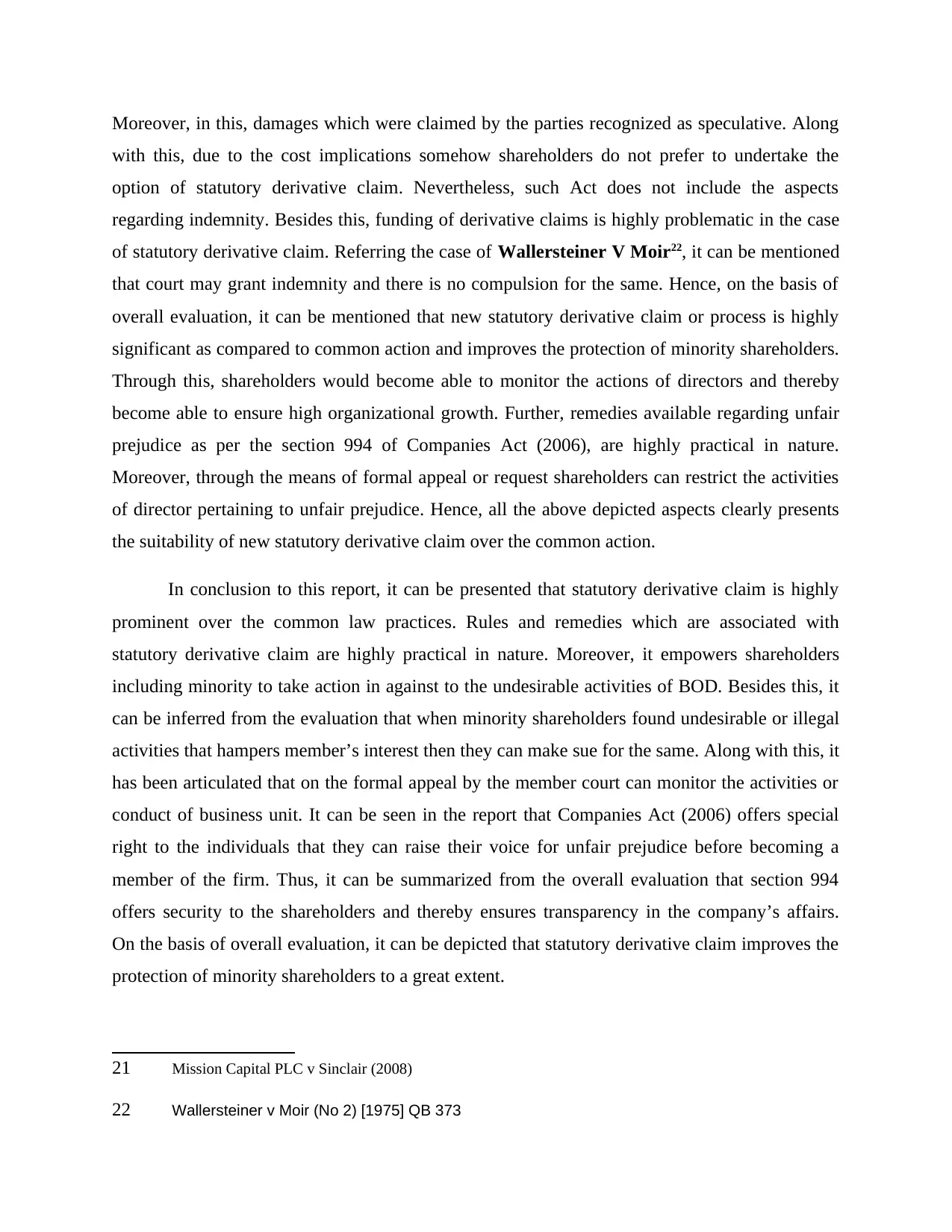
Moreover, in this, damages which were claimed by the parties recognized as speculative. Along
with this, due to the cost implications somehow shareholders do not prefer to undertake the
option of statutory derivative claim. Nevertheless, such Act does not include the aspects
regarding indemnity. Besides this, funding of derivative claims is highly problematic in the case
of statutory derivative claim. Referring the case of Wallersteiner V Moir22, it can be mentioned
that court may grant indemnity and there is no compulsion for the same. Hence, on the basis of
overall evaluation, it can be mentioned that new statutory derivative claim or process is highly
significant as compared to common action and improves the protection of minority shareholders.
Through this, shareholders would become able to monitor the actions of directors and thereby
become able to ensure high organizational growth. Further, remedies available regarding unfair
prejudice as per the section 994 of Companies Act (2006), are highly practical in nature.
Moreover, through the means of formal appeal or request shareholders can restrict the activities
of director pertaining to unfair prejudice. Hence, all the above depicted aspects clearly presents
the suitability of new statutory derivative claim over the common action.
In conclusion to this report, it can be presented that statutory derivative claim is highly
prominent over the common law practices. Rules and remedies which are associated with
statutory derivative claim are highly practical in nature. Moreover, it empowers shareholders
including minority to take action in against to the undesirable activities of BOD. Besides this, it
can be inferred from the evaluation that when minority shareholders found undesirable or illegal
activities that hampers member’s interest then they can make sue for the same. Along with this, it
has been articulated that on the formal appeal by the member court can monitor the activities or
conduct of business unit. It can be seen in the report that Companies Act (2006) offers special
right to the individuals that they can raise their voice for unfair prejudice before becoming a
member of the firm. Thus, it can be summarized from the overall evaluation that section 994
offers security to the shareholders and thereby ensures transparency in the company’s affairs.
On the basis of overall evaluation, it can be depicted that statutory derivative claim improves the
protection of minority shareholders to a great extent.
21 Mission Capital PLC v Sinclair (2008)
22 Wallersteiner v Moir (No 2) [1975] QB 373
with this, due to the cost implications somehow shareholders do not prefer to undertake the
option of statutory derivative claim. Nevertheless, such Act does not include the aspects
regarding indemnity. Besides this, funding of derivative claims is highly problematic in the case
of statutory derivative claim. Referring the case of Wallersteiner V Moir22, it can be mentioned
that court may grant indemnity and there is no compulsion for the same. Hence, on the basis of
overall evaluation, it can be mentioned that new statutory derivative claim or process is highly
significant as compared to common action and improves the protection of minority shareholders.
Through this, shareholders would become able to monitor the actions of directors and thereby
become able to ensure high organizational growth. Further, remedies available regarding unfair
prejudice as per the section 994 of Companies Act (2006), are highly practical in nature.
Moreover, through the means of formal appeal or request shareholders can restrict the activities
of director pertaining to unfair prejudice. Hence, all the above depicted aspects clearly presents
the suitability of new statutory derivative claim over the common action.
In conclusion to this report, it can be presented that statutory derivative claim is highly
prominent over the common law practices. Rules and remedies which are associated with
statutory derivative claim are highly practical in nature. Moreover, it empowers shareholders
including minority to take action in against to the undesirable activities of BOD. Besides this, it
can be inferred from the evaluation that when minority shareholders found undesirable or illegal
activities that hampers member’s interest then they can make sue for the same. Along with this, it
has been articulated that on the formal appeal by the member court can monitor the activities or
conduct of business unit. It can be seen in the report that Companies Act (2006) offers special
right to the individuals that they can raise their voice for unfair prejudice before becoming a
member of the firm. Thus, it can be summarized from the overall evaluation that section 994
offers security to the shareholders and thereby ensures transparency in the company’s affairs.
On the basis of overall evaluation, it can be depicted that statutory derivative claim improves the
protection of minority shareholders to a great extent.
21 Mission Capital PLC v Sinclair (2008)
22 Wallersteiner v Moir (No 2) [1975] QB 373
⊘ This is a preview!⊘
Do you want full access?
Subscribe today to unlock all pages.

Trusted by 1+ million students worldwide
1 out of 15
Related Documents
Your All-in-One AI-Powered Toolkit for Academic Success.
+13062052269
info@desklib.com
Available 24*7 on WhatsApp / Email
![[object Object]](/_next/static/media/star-bottom.7253800d.svg)
Unlock your academic potential
Copyright © 2020–2026 A2Z Services. All Rights Reserved. Developed and managed by ZUCOL.





